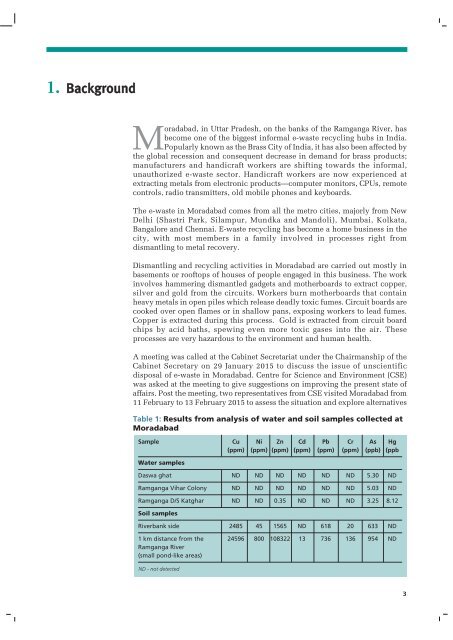moradabad-e-waste
moradabad-e-waste
moradabad-e-waste
- No tags were found...
Create successful ePaper yourself
Turn your PDF publications into a flip-book with our unique Google optimized e-Paper software.
1. Background<br />
Moradabad, in Uttar Pradesh, on the banks of the Ramganga River, has<br />
become one of the biggest informal e-<strong>waste</strong> recycling hubs in India.<br />
Popularly known as the Brass City of India, it has also been affected by<br />
the global recession and consequent decrease in demand for brass products;<br />
manufacturers and handicraft workers are shifting towards the informal,<br />
unauthorized e-<strong>waste</strong> sector. Handicraft workers are now experienced at<br />
extracting metals from electronic products—computer monitors, CPUs, remote<br />
controls, radio transmitters, old mobile phones and keyboards.<br />
The e-<strong>waste</strong> in Moradabad comes from all the metro cities, majorly from New<br />
Delhi (Shastri Park, Silampur, Mundka and Mandoli), Mumbai, Kolkata,<br />
Bangalore and Chennai. E-<strong>waste</strong> recycling has become a home business in the<br />
city, with most members in a family involved in processes right from<br />
dismantling to metal recovery.<br />
Dismantling and recycling activities in Moradabad are carried out mostly in<br />
basements or rooftops of houses of people engaged in this business. The work<br />
involves hammering dismantled gadgets and motherboards to extract copper,<br />
silver and gold from the circuits. Workers burn motherboards that contain<br />
heavy metals in open piles which release deadly toxic fumes. Circuit boards are<br />
cooked over open flames or in shallow pans, exposing workers to lead fumes.<br />
Copper is extracted during this process. Gold is extracted from circuit board<br />
chips by acid baths, spewing even more toxic gases into the air. These<br />
processes are very hazardous to the environment and human health.<br />
A meeting was called at the Cabinet Secretariat under the Chairmanship of the<br />
Cabinet Secretary on 29 January 2015 to discuss the issue of unscientific<br />
disposal of e-<strong>waste</strong> in Moradabad. Centre for Science and Environment (CSE)<br />
was asked at the meeting to give suggestions on improving the present state of<br />
affairs. Post the meeting, two representatives from CSE visited Moradabad from<br />
11 February to 13 February 2015 to assess the situation and explore alternatives<br />
Table 1: Results from analysis of water and soil samples collected at<br />
Moradabad<br />
Sample Cu Ni Zn Cd Pb Cr As Hg<br />
(ppm) (ppm) (ppm) (ppm) (ppm) (ppm) (ppb) (ppb<br />
Water samples<br />
Daswa ghat ND ND ND ND ND ND 5.30 ND<br />
Ramganga Vihar Colony ND ND ND ND ND ND 5.03 ND<br />
Ramganga D/S Katghar ND ND 0.35 ND ND ND 3.25 8.12<br />
Soil samples<br />
Riverbank side 2485 45 1565 ND 618 20 633 ND<br />
1 km distance from the 24596 800 108322 13 736 136 954 ND<br />
Ramganga River<br />
(small pond-like areas)<br />
ND - not detected<br />
3


